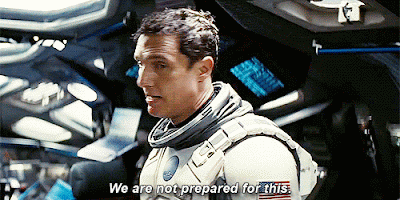The recent discovery of liquid water on Mars is what inspired this week's movie. Christopher Nolan's 2014 film Interstellar prompts that feeling of crushing insignificance and the reminder of just how small one individual is in comparison to the universe surrounding us.
Does this make you nervous? Don't worry, the main take away from this film is the power one individual can have if they exercise enough persistence. That, and just how awesome science truly is. (Seriously, a lot of thought and research went into making this movie as scientifically accurate as possible.)
Disclaimer: Many spoilers below because the understanding the plot of the film is crucial to understanding what makes it an important film.
 |
| Source |
Although the film is action packed as the characters encounter their fair share of challenges that come with space travel, it is the idea of love for family and friends that motivates the characters to keep pursuing their goal. Time is their most prevalent enemy. Cooper is in space long enough to miss the birth of his grandchildren after his son grows up while Cooper has aged only a few months in the same period. In fact, he misses the entirety of his children's lives, due to the space-time warp across the wormholes.
Realizing how much a father would sacrifice for his family is not a new concept in movies. However, watching a grown man cry is something always touches the heart. In fact this is the scene that made me tear up while watching this movie in theaters, and it still continues to be the most heartbreaking part of the movie no matter how many times you watch it.
These moments are what we find the most relatable because we can connect to them emotionally. However, while this film permeates deeper and touches our emotions, it is a rare case where the true beauty of the film lies in the plot. To avoid too many spoilers I won't elaborate too much, but if you have seen the movie you were hopefully just as surprised and satisfied with the plot twist that bookends the entire movie. In the case of Interstellar, plot is the most important aspect that keeps us watching over and over. Nolan creates an unforgettable story as our minds are truly blown and we recall the immensity of the universe we live in.
This reflection is brought out solely through plot, because the deeper concepts of love and sacrifice are what relate to us on a small scale. It is when we are watching the characters fly through blackholes and landing on planets no longer in our solar system that we gain a better understanding of how small we are as just one person on Earth. This feeling evokes an internal reflection (whether good or bad is up to you) that leaves us thinking about the movie long after we have finished watching it. And that makes us want to watch it more and have our minds blown again.



I loved this movie when it came out but it did leave me a bit stumped and confused. Your descriptions clarified it for me and actually made me realize few things I hadn't before. I love movies already but understanding them in-depth leave a much bigger impact so, thank you for that!
ReplyDeleteI have not seen this movie but a point you made in the final paragraph of your blog about the earth being so small and insignificant in the vastness of space always takes my breath away, as you stated....mind blown. Again and again this happens when I think of space. This is a movie I have wanted to see but have not, this post re sparked my interest. Good job
ReplyDeleteI love Interstellar!! Chris Nolan is basically the greatest man of all time. I couldn't agree more about how the plot is what builds the movie. I believe this is what distinguishes Interstellar from other critically-acclaimed space movies, as the visual effects are used to supplement the story; the story isn't just there to supplement the visual effects. The movie is one of my favorites, but I do believe it peaked slightly early in its progression, and its finale was fitting but not legendary to me. I've seen better Nolan movie endings, but it was still great!
ReplyDeleteAlong with Max, I have not seen the movie either. I never intended on watching the movie, but your post makes me want to see it! Your statement about the blackholes and us being really small is totally true. In terms of being on Earth, we are smaller than ants in the universe.
ReplyDeleteYou did a very good job with this post of addressing the themes of this movie without spoiling the plot of the movie. While the movie's plot wasn't entirely logical, it was full of emotion, and it was that emotion you presented here. One small comment, what causes the time dilation is not the wormhole itself, but rather the extreme gravity of the black hole in the system they travel to. This further focuses the idea of time slipping away, because rather than simply it being a jump to the future, they are constantly having that time slip away faster than it is passing for them.
ReplyDelete